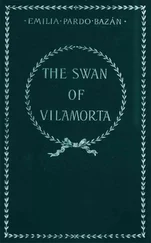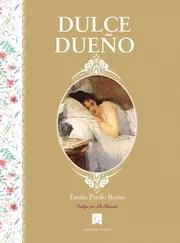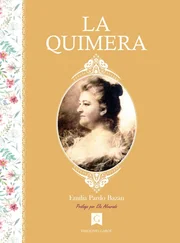Only the sidewalks were paved; the gutter was a gutter in reality; it was full of muddy pools and heaps of kitchen garbage, thrown there without scruple by the inhabitants. Segundo avoided two things—stepping into the gutter and walking in the moonlight. A man passed so close by him as almost to touch him, enveloped, notwithstanding the heat, in an ample cloak, and holding open above his head an enormous umbrella, although there was no sign of rain; doubtless he was some convalescent, some visitor to the springs, who was breathing the pleasant night air with hygienic precautions. Segundo, when he saw him, walked closer to the houses, turning his face aside as if afraid of being recognized. With no less caution he crossed the Plaza del Consistorio, the pride of Vilamorta, and then, instead of joining one of the groups who were enjoying the fresh air, seated on the stone benches round the public fountain, he slipped into a narrow side street, and crossing a retired little square shaded by a gigantic poplar turned his steps in the direction of a small house half hidden in the shadow of the tree. Between the house and Segundo there stood a lumbering bulk—the body of a stage-coach, a large box on wheels, its shafts raised in air, waiting, lance in rest, as it were, to renew the attack. Segundo skirted the obstacle, and as he turned the corner of the square, absorbed in his meditations, two immense hogs, monstrously fat, rushed out of the half-open gate of a neighboring yard, and at a short trot that made their enormous sides shake like jelly, made straight for the admirer of Becquer, entangling themselves stupidly and blindly between his legs. By a special interposition of Providence the young man did not measure his length upon the ground, but, his patience now exhausted, he gave each of the swine a couple of angry kicks, which drew from them sharp and ferocious grunts, as he ejaculated almost audibly: "What a town is this, good Heavens! Even the hogs must run against one in the streets. Ah, what a miserable place! Hell itself could not be worse!"
By the time he had reached the door of the house, he had, to some extent, regained his composure. The house was small and pretty and had a cheerful air. There was no railing outside the windows, only the stone ledges, which were covered with plants in pots and boxes; through the windows shaded by muslin curtains a light could be seen burning, and in the silent façade there was something peaceful and attractive that invited one to enter. Segundo pushed open the door and almost at the same instant there was heard in the dark hall the rustling of skirts, a woman's arms were opened and the admirer of Becquer, throwing himself into them, allowed himself to be led, dragged, carried bodily, almost, up the stairs, and into the little parlor where, on a table covered with a white crochet cover, burned a carefully trimmed lamp. There, on the sofa, the lover and the lady seated themselves.
Truth before all things. The lady was not far from thirty-six or thirty-seven, and what is worse, could never have been pretty, or even passably good-looking. The smallpox had pitted and hardened her coarse skin, giving it the appearance of the leather bottom of a sieve. Her small black eyes, hard and bright like two fleas, matched well her nose, which was thick and ill-shaped, like the noses of the figures of lay monks stamped on chocolate. True, the mouth was fresh-colored, the teeth white and sound like those of a dog; but everything else pertaining to her—dress, manner, accent, the want of grace of the whole—was calculated rather to put tender thoughts to flight than to awaken them. With the lamp shining as brightly as it does, it is preferable to contemplate the lover. The latter is of medium height, has a graceful, well-proportioned figure, and in the turn of his head and in his youthful features there is something that irresistibly attracts and holds the gaze. His forehead, which is high and straight, is shaded and set off by luxuriant hair, worn somewhat longer than is allowed by our present severe fashion. His face, thin and delicately outlined, casts a shadow on the walls which is made up of acute angles. A mustache, curling with the grace which is peculiar to a first mustache, and to the wavy locks of a young girl, shades but does not cover his upper lip. The beard has not yet attained its full growth; the muscles of the throat have not yet become prominent; the Adam's apple does not yet force itself on the attention. The complexion is dark, pale, and of a slightly bilious hue.
Seeing this handsome youth leaning his head on the shoulder of this woman of mature age and undisguised ugliness, it would have been natural to take them for mother and son, but anyone coming to this conclusion, after a single moment's observation, would have shown scant penetration, for in the manifestations of maternal affection, however passionate and tender they may be, there is always a something of dignity and repose which is wanting in those of every other affection.
Doubtless Segundo felt a longing to see the moon again, for he rose almost immediately from his seat on the sofa and crossed over to the window, his companion following him. He threw open the sash, and they sat down side by side in two low chairs whose seats were on a level with the flower-pots. A fine carnation regaled the sense with its intoxicating perfume; the moon lighted up with her silvery rays the foliage of the poplar that cast broad shadow over the little square. Segundo opened the conversation this wise:
"Have you made any cigars for me?"
"Here are some," she answered, putting her hand into her pocket and drawing from it a bundle of cigars. "I was able to make only a dozen and a half for you. I will complete the two dozen to-night before I go to bed."
There was a moment's silence, broken by the sharp sound made by the striking of the match and then, in a voice muffled by the first puff of smoke, Segundo went on:
"Why, has anything new happened?"
"New? No. The children—putting the house in order—and then—Minguitos. He made my head ache with his complaining—he complained the whole blessed evening. He said his bones ached. And you? Very busy, killing yourself reading, studying, writing, eh? Of course!"
"No, I have been taking a delightful walk. I went to Peñas-albas and returned by way of Santa Margarita. I have seldom spent a pleasanter evening."
"I warrant you were making verses."
"No, my dear. The verses I made I made last night after leaving you."
"Ah! And you weren't going to repeat them to me. Come, for the love of the saints, come, recite them for me, you must know them by heart. Come, darling."
To this vehement entreaty succeeded a passionate kiss, pressed on the hair and forehead of the poet. The latter raised his eyes, drew back a little and, holding his cigar between his fingers after knocking off the ashes with his nail, proceeded to recite.
The offspring of his muse was a poem in imitation of Becquer. His auditor, who listened to it with religious attention, thought it superior to anything inspired by the muse of the great Gustave. And she asked for another and then another, and then a bit of Espronceda and then a fragment or two of Zorrilla. By this time the cigar had gone out; the poet threw away the stump and lighted a fresh one. Then they resumed their conversation.
"Shall we have supper soon?"
"Directly. What do you think I have for you?"
"I haven't the least idea."
"Think of what you like best. What you like best, better than anything else."
"Bah! You know that so far as I am concerned, provided you don't give me anything smoked or greasy——"
"A French omelet! You couldn't guess, eh? Let me tell you—I found the receipt in a book. As I had heard that it was something good I wanted to try it. I had always made omelets as they make them here, so stiff, that you might throw one against the wall without breaking it. But this—I think it will be to your taste. As for me, I don't like it much, I prefer the old style. I showed Flores how to make it. What was in the one you ate at the inn at Orense? Chopped parsley, eh?"
Читать дальше












